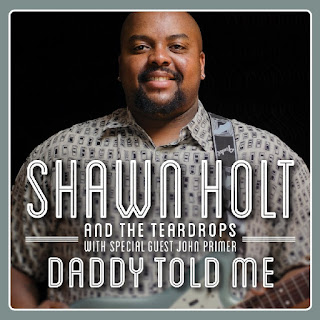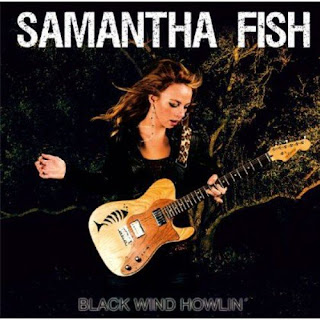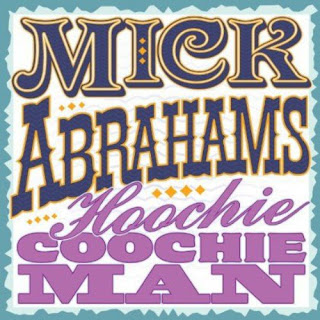Friday, July 30, 2021
Archive Review: Poundhound’s Massive Grooves From the Electric Church... (1998)
With Massive Grooves From the Electric Church of Psychofunkadelic Grungelism Rock Music (the album’s full and glorious title), Pinnick and his Poundhound mates explore the funkier sides of King’s X music (of which Pinnick is an integral part), creating, well, some “massive grooves.” The disc opens with a funky-cool space-jammin’ psychedelic rant reminiscent of Hendrix on Axis: Bold As Love. From there, the single word-titled songs explore a pleasant musical mix of P-Funkish grooves, metallic riffs and improvisational instrumentation. Although there’s not a bum track here, some songs work better than others do. Those that strike true – like the monstrous “Darker,” the effervescent spiritual booty-shaker “Jangle” or the ethereal “PsychoLove” – are fine songs, indeed.
Pinnick is a rare talent, a group player that contributes to making King’s X one of the most underrated outfits in rock ‘n’ roll today. As shown by Massive Grooves, he is also a visionary solo artist willing to explore the possibilities of the music and is quite a talented guitarist in his own right. Although he has made a career with his band, Pinnick’s Poundhound project shows that, for this artist, there’s also life alongside King’s X. (Metal Blade Records, released 1998)
Review originally published by Alt.Culture.Guide™, 1998
Friday, July 23, 2021
Classic Rock Review: Gregg Allman’s Laid Back (1973)
Gregg began thinking about exploring a solo career and, in late ’72, he began work on Laid Back, with friend and former bandmate Johnny Sandlin co-producing the album. Desiring to explore musical avenues apart from the ABB, Allman had Sandlin enlist a talented crop of musicians, including old friends like guitarists Scott Boyer and Tommy Talton (from the Southern rock band Cowboy) and keyboardists Chuck Leavell (a future ABB member) and Paul Hornsby as well as bandmates Jaimoe and Butch Trucks. The album’s eight songs featured four written by Allman, one Boyer composition, and a couple of choice cover songs that explored the possibilities of rock, blues, jazz, gospel, and R&B music (i.e. Americana).
The resulting mix of sounds on Laid Back found an audience not only among ABB fans but also with newcomers who appreciated Allman’s soulful vocals and the album’s “laid back” blend of instrumentation and melodic musical styles. The hit single was Allman’s “Midnight Rider,” probably as close to the ABB sound as the singer would get here, an eerie swamp-rock soundtrack resonating behind Allman’s haunted vocals. There are other solid moments here, though – the smoky late-night blues vibe of “Queen of Hearts,” which offers jazzy undercurrents; an inspired, up-tempo cover of the 1964 R&B hit “Don’t Mess Up A Good Thing”; and the gospel fervor of the traditional “Will the Circle Be Unbroken” – all of which drove the album to #13 on the charts, selling better than half a million copies. It also launched Allman’s solo career, separating him from his longtime band and ensuring a musical legacy of his own. (Capricorn Records, 1973)
Buy the CD from Amazon: Gregg Allman’s Laid Back
Archive Review: Shawn Holt & the Teardrops’ Daddy Told Me (2013)
Teaming with longtime Teardrops Chris Biedron on bass and drummer Brian “B.J.” Jones, Holt enlisted guitarist Levi William and family friend and Chicago blues guitar legend John Primer to put together Daddy Told Me. The results speak loudly for themselves, the album a wonderful collection of inspired versions of songs written or popularized by Magic Slim alongside Holt’s own well-written originals.
The title track draws upon Chicago blues tradition while still sounding contemporary, the band cranking out a deep, driving groove atop which Holt layers on his gruff, growling vocals on a tale of romantic turmoil as the guitars grind and howl. Holt’s “Hold You Again” follows a similar template, matching muscular guitar-driven blues with an unrelenting rhythm. By contrast, Magic Slim’s “Buddy Buddy Friend” displays a playful side to the band, with spry vocals and less bruising, more intricate fretwork.
A cover of Bo Diddley’s “Before You Accuse Me” is an old-school delight, with John Primer’s swinging vocals and stinging guitar an undeniable pleasure while Holt’s “You Done Me Wrong” offers the perfect match of traditional and contemporary Chicago blues, whipsmart guitar and jaunty rhythms dragging the form into the 21st century. Bottom line: if you were a Magic Slim fan, you’re going to love Daddy Told Me! Grade: B+ (Blind Pig Records, released September 24th, 2013)
Buy the CD from Amazon: Shawn Holt & the Teardrops’ Daddy Told Me
Friday, July 16, 2021
Archive Review: Samantha Fish’s Black Wind Howlin’ (2013)
Working again with fellow Missouri native Mike Zito as producer, and featuring Zito’s Royal Southern Brotherhood bandmates Charlie Wooten (bass) and Yonrico Scott (drums) along with Zito (guitar), and harp player Johnny Sansone, Black Wind Howlin’ offers up ten electrifying performances, nine of them written or co-written by the talented Ms. Fish.
There’s so much that’s good about Black Wind Howlin’ that it’s hard to find a place to start the praise. “Miles To Go” is a hard-rockin’ blues tune that veers dangerously close to metal turf (think Motorhead’s “Ace of Spades”), the song’s unrelenting rhythm, restless “life on the road” lyrics, and scorched earth fretwork making for an invigorating listen. By contrast, “Kick Around” could make Fish a lot of money in song-starved Nashville, the tune a near-perfect mix of blues roots, roots-rock, and twangy guitar courtesy of Mr. Zito while “Go To Hell,” written with Zito, features a monster stomp ‘n’ stammer rhythm, big drumbeats, Fish’s malevolent guitar, and guest Paul Thorn’s delightfully gravel-throated vox.
Sansone shines on “Sucker Born,” his wildfire harp offering a nice counterpoint to Fish’s smoldering vocals and stunning guitarplay and a cover of Howlin’ Wolf’s “Who’s Been Talking” is delivered throwback style, with sultry vocals and swinging guitar and harmonica creating a dangerous vibe. Fish is a fine lyricist, imaginative and inventive while still learning the ropes, but it’s her amazing six-string skills that will enchant and hypnotize the listener. Don’t let her youth and gender fool you…Samantha Fish is genuinely bad to the bone, and only getting better! Grade: A (Ruf Records, released September 10, 2013)
Buy the CD from Amazon: Samantha Fish’s Black Wind Howlin’
Friday, July 9, 2021
Classic Rock Review: Mick Abrahams’ A Musical Evening with Mick Abrahams (1971)
A Musical Evening with Mick Abrahams (often shortened to just Mick Abrahams) was the guitarist’s solo debut, a mixed effort that showcases his six-string skills while also revealing the gaps in his songwriting abilities. The album-opening “Greyhound Bus” offers an infectiously-funky rhythm with scraps of Abrahams’ guitar shining through the dense mix alongside Bob Sargeant’s keyboard riffs, while “Awake” presages prog-rock with its dark ambience, subdued vocals, and instrumental prowess. The fleet-of-foot “Big Queen” is similarly priggish, but with blues threads woven throughout similar to what Mountain, Bloodrock, and even Beck, Bogart & Appice would be doing a year or two hence.
However, the album goes off the tracks with the curious, weak-kneed “Winds of Change,” which is too soft-edged for blues-rock, its psychedelic pretensions a few years past the “sell by” date. Abrahams’ “Seasons” partially redeems the album’s excesses; a more straight-forward rocker with blues and prog tendencies, there is plenty of ominous keyboards, razor-sharp fretwork, and exotic instrumentation beneath the gang vocals to fill the song’s lengthy 15-minute run time. While not the most auspicious of debut albums, A Musical Evening with Mick Abrahams offers a glimpse of the guitarist’s immense talents. Abrahams would take keyboard wizard Bob Sargeant and big-beat drummer Richie Dharma with him to the Mick Abrahams Band for a single LP the following year. (Chrysalis Records, 1971)
Buy the CD from Amazon: Mick Abrahams’ A Musical Evening with Mick Abrahams
Archive Review: Mick Abrahams' Hoochie Coochie Man (2013)
Featuring ten Abrahams’ originals written or co-written by the guitarist, along with a handful of well-chosen blues covers, Hoochie Coochie Man represents Abrahams in fine form. From jump street, I have a major bone to pick with the album’s lack of musician credits...Abrahams is clearly singing with other artists on several tracks, there’s some fine harp work peppering a few songs, and there is some solid musicianship, but you couldn’t tell it from the sparse info provided. Next time around, let’s not keep this stuff secret, OK?
That said, Hoochie Coochie Man is an entertaining collection, rife with the kind of blistering fretwork that you monster fans of blues-rock guitar eat up, the party starting with the lively title track. Abrahams nails the Willie Dixon blues standard (by way of Muddy Waters) with a rollicking arrangement, scorching guitar, and somebody’s flailing harp raging away in the background. The instrumental “Sunday Drivin’” is the kind of six-string romp that Jeff Beck used to crank out circa 1968 or so, while Abrahams’ original “Roadroller” is a swinging jump blues-styled rocker with plenty of jazzy guitar pickin’.
A cover of the Sonny Terry and Brownie McGhee gem “Cornbread and Peas” is delivered with hearty vocal harmonies, jolts of scrappy harp, and subdued but elegant guitar and the slinky “I Ain’t Never” displays a different facet of Abrahams’ talents, greasy guitar licks and a languid tempo approximating the Piedmont blues style quite nicely. Overall, Hoochie Coochie Man is a lot of fun, Abrahams not re-inventing the blues but offering enough of his own flavor to spice up the musical gumbo; docked half a grade for the lack of musician info. Grade: B (Secret Records, released November 5, 2013)
Buy the CD from Amazon: Mick Abrahams’ Hoochie Coochie Man
Friday, July 2, 2021
Book Review: John Kruth's To Live's to Fly: The Ballad of the Late, Great Townes Van Zandt (2007)
For those unfamiliar with the man that many consider country music's poet laureate, Townes Van Zandt was born to a wealthy Fort Worth, Texas family whose roots reach back to the city's founding. Like most musicians of his generation, a 12-year-old Townes was mesmerized by Elvis Presley's 1956 appearance on The Ed Sullivan Show. Afterwards, Kruth writes that "overnight, Van Zandt became completely obsessed with rock and roll." Having grown up on the country sounds of Lefty Frizzell and Hank Williams, Van Zandt's new favorites were Ricky Nelson, Jerry Lee Lewis and the Everly Brothers. It was his father, however, who suggested that he begin writing his own songs, pointing the young Van Zandt towards his eventual destiny.
Van Zandt went to college, but he really wasn't one to attend classes, instead
preferring to lock himself in his room, drink, listen to records, and play the
guitar. The education he received wasn't what his parents believed it would
be. Concerned about his drinking and wild ways, his parents had TVZ committed
to a mental hospital in Galveston, Texas where he was diagnosed as "manic
depressive" and received three months of electric-and-insulin-shock therapy.
The impact this treatment had on Van Zandt is arguable, but it most likely
contributed to his ongoing adult depression, alcoholism and mental
instability.
He married, went back to college for a while, finally
dropping out in 1964, ending up in Houston doing the only thing he had ever
really wanted to do: sing and write songs. Van Zandt fell in with a
like-minded crowd of singer/songwriters that included life-long friend Guy
Clark, Mickey Newbury, and Jerry Jeff Walker. It was here that Van Zandt honed
his performance skills and began displaying the songwriting skills that have
made him a legend.
Over the next 30 years, Van Zandt would go on to
record some two-dozen albums for a number of independent labels and write
scores of songs, some like "Pancho & Lefty" or "If I Needed You" becoming
significant hits for other artists. He moved to Nashville in 1976, but headed
back to Texas in '78 and didn't record again for almost a decade. He landed
back in the "Music City" just when his songwriting fortunes began to rise, and
it was in Nashville that he died on New Year's Day, 1997.
The
mystery of Van Zandt's appeal is easy to solve. A charismatic personality and
performer, Van Zandt possessed a great charm and intelligence. By any
standards, Van Zandt wasn't really a country artist...influenced greatly by
bluesman Lightnin' Hopkins, his music is more a mix of twangy folk and country
blues. His skill with the language, however, is pure poetry, his lyrics
expressing intricate thoughts and emotions but flowing casually. His influence
on songwriters crosses all musical genres, however, and it comes as no
surprise that artists as disparate as Willie Nelson, Emmylou Harris, Mudhoney,
and the Cowboy Junkies, among others, have recorded his songs.
To Live's To Fly" offers an in-depth and, at times, depressingly exhaustive
overview of Van Zandt's life, from childhood through his death. Kruth
interviewed hundreds of Van Zandt's friends, family and fellow artists and
paints a detailed portrait of both the man and the demons that plagued him for
most of his life. Most of all, Kruth provides an understanding of the man
through both his actions and his songs. (Da Capo Press, published March 5th, 2007)
Review originally published by Country Standard Time music zine
Buy the book from Amazon: John Kruth's To Live's to Fly: The Ballad of the Late, Great Townes Van Zandt







